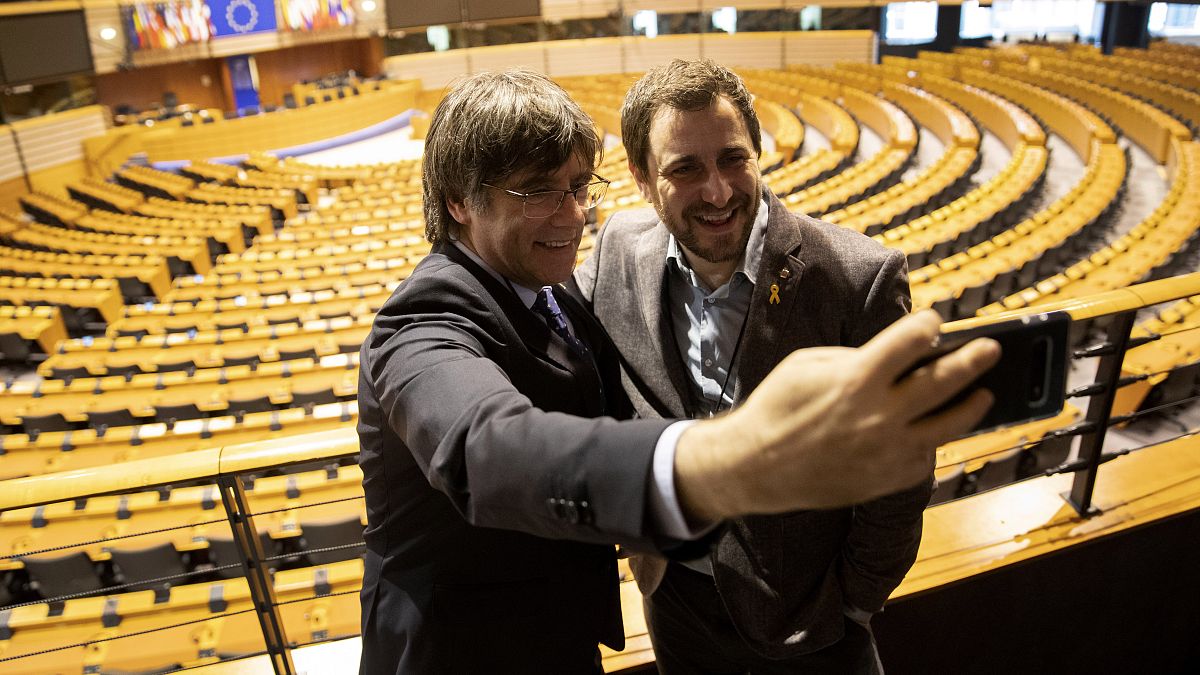What does the ECJ ruling mean for Puigdemont and how does EU law work in the Catalonian indpendence struggle. An explainer.
Europe’s top court has recognized the immunity of former Catalan VP Oriol Junqueras — but it remains unclear how the ruling will affect the fate of former Catalan independence leaders Carles Puigdemont and Toni Comin.
Junqueras is serving a provisional prison sentence for sedition and misappropriation of public funds.
Puigdemont and Comin are currently in Brussels preparing to take their seats at the European Parliament after EU judges suspended an order stopping them from becoming MEPs.
Spain's state prosecutors' office asked a Spanish judge on Monday to maintain the international arrest warrants for s Puigdemont and Comin as they attempt to take seats in the European Parliament.
Euronews spoke to Ana María González Marín, EU law professor at the Francisco de Vitoria University (Madrid) and Victor Ferreres Comella, professor of constitutional law at the Pompeu Fabra University (Barcelona) about the European Court of Justice ruling on Junqueras.
Does Oriol Junqueras have immunity due to his MEP status?
According to González, the European Court of Justice (ECJ) took into consideration that Junqueras acquired his status as a MEP on June 13, 2019, after the European Parliament elections. This means that his lawyer can claim immunity for him.
Both experts argue that, in practice, it is not so straightforward. “Part of the privileges of immunity would be the lifting of the provisional prison sentence to allow Junqueras to move into the European Parliament. But if the Supreme Court insists that the sentence must be served, it must send a request to the parliament,” González explains.
Ferreres clarifies that, if there is no ruling from the European Parliament, the prison sentence remains in place.
He said that immunity does not cover all circumstances in EU law. “The main purpuse of immunity is the protection of the European Parliament itself as an institution and not that of its members. If an MEP is accused of a crime, he cannot claim immunity."
Could Junqueras continue to serve a prison sentence as an MEP?
González's said, the ERC leader is unlikely to take his seat in the European Parliament: “Mainly because the sentence as well as the depravation of his freedom are firm facts. The CJEU ruling doesn't change that."
Would the Supreme Court have to ask the Court of Justice of the European Union to keep Junqueras in prison?
"Under no circumstances," both experts agreed.
Ferreres, professor at Pompeu Fabra University said, once the trial was over, the Spanish Supreme Court would not have to ask the European Parliament for permission to pronounce the jail sentence.
“According to European regulation, an MEP enjoys the same rights as his country's parliamentarians when he is at home. The Supreme Court interpreted Spanish law to mean that it is not necessary to ask the European Parliament for permission to issue a criminal sentence when the trial has already been held."
The Supreme Court could proceed to issue the sentence even if the pre-trial detention would've had to be lifted, Ferreres added.
Junqueras' lawyer has asked for the sentence to be annuled. Could that happen?
According to EU law expert González, this is impossible. “The scope of immunity established by Article 9 of the protocol on privileges and immunities of the European Union does not extend to final sentences that are carried out in a different jurisdiction."
According to Ferreres, the sentence implies the termination of the European Parliament mandate. “European law refers to national law at that point. Junqueras will cease to be an MEP the moment the Supreme Court's disqualification sentence goes into effect.”
How does this sentence affect Puigdemont and Comín?
With regards to both leaders of the Catalan independence movement, Ferreres says the arrest warrant in Spain remains in effect. “The Supreme Court can maintain this warrant and immediately ask the European Parliament to suspend immunity,” he explains.
"As long as the European parliament has not taken a decision yet, the judicial order can be maintained, which means that they could be arrested if they enter Spanish territory," the professor added.
Has the Court of Justice of the European Union interfered with Spanish law?
The European judgment does not constitute an case attempt to modify national provisions, Gonzalez stresses.
